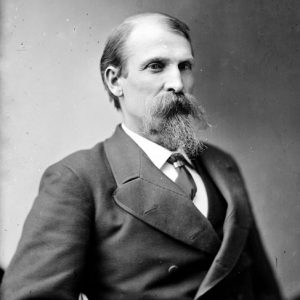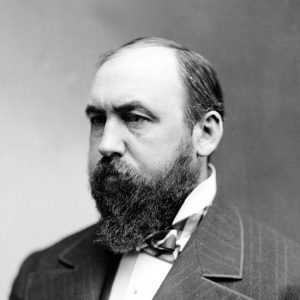calsfoundation@cals.org
Carpetbaggers and Scalawags
“Carpetbaggers” is a slang term denoting men who adhered to the newly formed Republican Party, which followed the demise of the Whig Party, and gained control of Arkansas politics and government after the end of Civil War. Many of these men were former Union soldiers. The correct term is Radical Republicans.
Southerners coined the pejorative term carpetbaggers and claimed that these men came into the state with only what could be packed in a suitcase made from carpet scraps. The belief was that these men were uneducated opportunists who came to Arkansas only to plunder and take advantage of the bankrupt, defeated, and humiliated people of the state. Noted carpetbaggers included Thomas Meade Bowen, a lawyer, and Powell Clayton, an engineer (both of whom had served as Union generals), as well as former Union soldiers John McClure, a lawyer, John Newton Sarber, a lawyer, and Stephen Dorsey, a businessman.
“Scalawag” was the term assigned to those Southerners who had opposed secession or fought for the Union or joined forces with the Radical Republicans to rebuild the state economically and to bring innovations to Arkansans, who were often resistant to change. They were considered traitors to the Southern way of life. One of the more prominent Arkansas scalawags was Asa Hodges, a former slave owner from Crittenden County.
Despite the ire directed to them by pro-Confederate natives, those dubbed carpetbaggers did leave behind a fairly positive legacy. The most substantive and positive change that the Radical Republicans created was a statewide public school system. There had been no statewide school system previously, and educational advantages were few. The fact that the population was to be taxed to operate the schools met with opposition. Part of the new educational system was the creation of Arkansas Industrial University, a land grant school. It is now known as the University of Arkansas (UA) in Fayetteville (Washington County) and is the largest university in the state. Too, the Radical Republicans extended railroad lines into Arkansas, connecting sections of the state to each other and to the nation for the first time, though this project was often rife with graft and corruption.
While serving in the Arkansas General Assembly, the Radical Republicans formed sixteen new counties, and they honored their own by the county names. When the Democrats regained control of the legislature, they changed the names of three counties: Sarber County became Logan County, Dorsey County became Cleveland County, and Clayton County was shortened to Clay County.
Although Clayton, Bowen, and Sarber married Arkansas women, only one of theses men, John Sarber, lived in Arkansas the remainder of his life. Sarber, who practiced law in Clarksville (Johnson County), became known as “Mr. Republican” in later years. Powell Clayton later served as governor and U.S. senator from Arkansas. Steven Dorsey served the state as a U.S. senator and later was a senator from New Mexico. Thomas Bowen, who had served in the Iowa and Kansas legislatures, eventually became very wealthy in the mining industry in Colorado and served as a U.S. senator from that state.
The most lasting effect the carpetbagger government had on the state was the 1868 constitution, which was ratified on March 13, 1868, to begin the Reconstruction Era in Arkansas. Though replaced by a new constitution in 1874 (which is still used today, in greatly amended form), the 1868 constitution, for the first time, prohibited racial discrimination and provided support for public education and a university.
The Radical Republicans later started quarreling among themselves and split into two factions, named the Minstrels and the Brindletails, allowing ex-Confederates, who had by then regained the right to vote, to capture control of state government once again.
The term “scalawag” has returned to its original meaning of rascal, but the term “carpetbagger” has remained in the Southern vocabulary with its original definition.
For additional information:
DeBlack, Thomas A. With Fire and Sword: Arkansas, 1861–1874. Fayetteville: University of Arkansas Press, 2003.
Moneyhon, Carl H. The Impact of the Civil War and Reconstruction on Arkansas. Baton Rouge: Louisiana University Press, 1994.
Mary Frances Hodges
Little Rock, Arkansas
 Powell Clayton
Powell Clayton  Stephen Dorsey
Stephen Dorsey  Asa Hodges
Asa Hodges 



Comments
No comments on this entry yet.